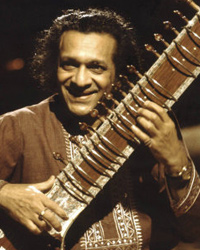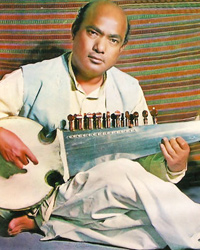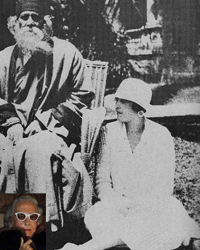
A foreign body - but a heart & soul of a Bengali II
Last updated: 5 October 2017 From the section 1971 Muktijuddho
Indian Ravi Shankar and Ustad Ali Akber Khan & British George Harrison - the world's first aid event
On 1 August 1971, Indian sitar maestro Ravi Shankar and ex-Beatle George Harrison organised two benefit concerts in Madison Square Garden in New York City, USA, entitled 'Concert for Bangla Desh' (as 'Bangladesh' was spelt then) to bring awareness and aid to the plight of the Bengalis.
It was the first time in history that such a concert was being held - and this would later inspire other famous concerts such as Live Aid (1985) and it's predecessor Band Aid (1984).
Many world famous and leading musician participated in the Concert for Bangla Desh, including Ustad Ali Akbar Khan, Ringo Starr, Bob Dylan, Eric Clapton, Billy Preston, Leon Russel and the band Badfinger.
 Ravi Shankar (1920 - 2012)
Ravi Shankar (1920 - 2012)  George Harrison (from The Beatles) (1943 – 2001)
George Harrison (from The Beatles) (1943 – 2001)  Ustad Ali Akbar Khan (1922 - 2009)
Ustad Ali Akbar Khan (1922 - 2009)
You can view videos and get indepth insight into this groundbreaking event in our Bhola Cyclone article.
Argentine Victoria Ocampo - campaigned for Bangladesh even though aged 90
Victoria Ocampo was an Argentine writer and intellectual, described by Jorge Luis Borges as "La mujer más argentina" (the quintessential Argentine woman). Best known as the architect of cultural bridges between the American and European continents and as publisher of the legendary literary magazine Sur (1931 - 1992), she was also a writer and critic in her own right and one of the most prominent South American women of her time.
Her love for Bengali poet Rabindranath Tagore was legendary and she remained a lifelong follower of Tagore.
 Victoria Ocampo (1890 - 1979)
Victoria Ocampo (1890 - 1979)
In 1971, Victoria Ocampo waged a campaign in her country Argentina seeking justice and freedom for the people of Bangladesh, and an end to the oppression carried out by the Pakistani government. What made her stance even more remarkable was that she was 90 years old. Tender, frail, and barely able to look after her own self, Victoria Ocampo used her high status to focus world's attention to the Bangladesh tragedy and led a passionate campaign to help the Bengalis.
American Joan Baez - sings her heart out for Bangladesh
Highly reputable American musician Joan Baez wrote and performed the song "The Story of Bangladesh" at the Concert for Bangladesh, Madison Square Garden in 1971. This song was based on the Pakistan Army crackdown on unarmed sleeping Bengali students at Dhaka University on 25 March 1971, which ignited the nine-month Bangladesh Liberation War. The song was later entitled "The Song of Bangladesh" and released in the chart-topping 'Come From the Shadows' album on May 1972.
 Joan (Chandos) Baez (Born 1941) American folk singer, songwriter, musician, and a prominent activist in the fields of human rights, peace, and environmental justice. Has a distinctive vocal style, with a strong vibrato. Songs and material typically deal with social issues. Began recording career in 1960, and achieved immediate success. Her first three albums, 'Joan Baez', 'Joan Baez Vol. 2', and 'Joan Baez in Concert' all achieved gold record status, and stayed on the hit album charts for two years. Long history of campaigning for social and environmental issues such as Civil Right movement led by Martin Luther King Jr., Vietnam War, Iraq war, gay and lesbian rights, and much more. Amnesty International, the largest grassroots human rights organization in the world, introduced the 'Amnesty International Joan Baez Award' on 18 March 2011 (at their 50th Anniversary Annual General Meeting in San Francisco) in her honour. The award is given to an artist - music, film, sculpture, paint or other medium - for Outstanding Inspirational Service in the Global Fight for Human Rights.
Joan (Chandos) Baez (Born 1941) American folk singer, songwriter, musician, and a prominent activist in the fields of human rights, peace, and environmental justice. Has a distinctive vocal style, with a strong vibrato. Songs and material typically deal with social issues. Began recording career in 1960, and achieved immediate success. Her first three albums, 'Joan Baez', 'Joan Baez Vol. 2', and 'Joan Baez in Concert' all achieved gold record status, and stayed on the hit album charts for two years. Long history of campaigning for social and environmental issues such as Civil Right movement led by Martin Luther King Jr., Vietnam War, Iraq war, gay and lesbian rights, and much more. Amnesty International, the largest grassroots human rights organization in the world, introduced the 'Amnesty International Joan Baez Award' on 18 March 2011 (at their 50th Anniversary Annual General Meeting in San Francisco) in her honour. The award is given to an artist - music, film, sculpture, paint or other medium - for Outstanding Inspirational Service in the Global Fight for Human Rights.
Bangladesh, Bangladesh
Bangladesh, Bangladesh
When the sun sinks in the west
Die a million people of the BangladeshThe story of Bangladesh
Is an ancient one again made fresh
By blind men who carry out commmands
Which flow out of the laws upon which nation stands
Which is to sacrifice a people for a landBangladesh, Bangladesh
Bangladesh, Bangladesh
When the sun sinks in the west
Die a million people of the BangladeshOnce again we stand aside
And watch the families crucified
See a teenage mother's vacant eyes
As she watches her feeble baby try
To fight the monsoon rains and the cholera fliesAnd the students at the university
Asleep at night quite peacefully
The soldiers came and shot them in their beds
And terror took the dorm awakening shrieks of dread
And silent frozen forms and pillows drenched in redBangladesh, Bangladesh
Bangladesh, Bangladesh
When the sun sinks in the west
Die a million people of the BangladeshDid you read about the army officer's plea
For donor's blood? It was given willingly
By boys who took the needles in their veins
And from their bodies every drop of blood was drained
No time to comprehend and there was little painAnd so the story of Bangladesh
Is an ancient one again made fresh
By all who carry out commands
Which flow out of the laws upon which nations stand
Which say to sacrifice a people for a landBangladesh, Bangladesh
Bangladesh, Bangladesh
When the sun sinks in the west
Die a million people of the Bangladesh'Song of Bangladesh', written & composed by Joan Baez
Though the song was not so strong lyrically, the message was loud and clear. This powerful message further highlighted the Bangladesh cause to the international masses. It was a great feat to have a renowned star like Joan Baez stand right beside the people of Bangladesh to uphold their constitutional right and seek justice for an oppressed nation. The song was a source of inspiration and strength to the 75 million people in those dark days of turmoil, uncertainty, pain, courage and innumerable deaths that brought independent Bangladesh.
The problem is consensus. There is a consensus out that it's ok to kill. If you kill inside the country you get into trouble. If you kill outside the country, right time, right season, latest enemy, you get a medal.
...The pacifist [peace maker] thinks there is only one tribe... the three billion members. They come first. We think killing any member of the family is a dumb idea. We think there are more decent and intelligent ways of settling differences and man had better start investigating these other possibilities because if he doesn't, then by mistake or by design he will probably kill off the whole human race....
...and many more!
In 2011, the Government of Bangladesh came up with a list of over 500 foreign friends who have made immense contribution during the Muktijuddho and the initial years of Bangladesh. Each one of them will receive honorary award from the government in recognition of their contribution. The awards will be given in two categories - "Bangladesh Muktijuddho Sammanana" (Bangladesh Liberation War Honour) and "Muktijuddho Moitri Sammanana" (Friends of Liberation War Honour).
This list includes as many as 24 international organisations, including Red Cross, United Nations High Commissioner for Refugees (UNHCR), British Broadcasting Corporation (BBC), Indian radio broadcaster Akash Bani, Geneva-based International Commission of Jurists, World Health Organisation, and International Labour Organisation.
The late Indian Prime Minister Indira Gandhi was the first 'foreign friend' to be conferred with the honorary award. She was awarded 'Bangladesh Freedom Honour' posthumously in July 2011. Her daughter-in-law and ruling Congress president Sonia Gandhi received the honour on her behalf at a special ceremony in the Bangabhaban (President's House) in Dhaka.
Other notable contributors include (but not limited to):
American
- Allen Ginsberg
- Anna Braun Taylor
- Archer K. Blood
- David Weisbrod
- Prof. Edward C. Dimock
- Edward C. Mason
- Cornelius Edward Gallagher
- Senator Edward M. Kennedy
- Senator Frank Forrester Church
- Senator Fred R. Harris
- Senator George Stanley McGovern
- Prof. J. Kenneth Galbraith
- Joseph Garst
- Lear Levin
- Richard K. Taylor
- Prof. Robert Dorfman
- Thomas A. Dine
- Father William Evans
- William Greenough
- Father William Richard Timm
- Senator William Saxbe
British
- Biman Mullick
- Bruce Douglas-Mann
- Sir Edward Richard George Heath
- Ellen Connett
- Lord Harold Wilson
- Julian Francis
- Michael Barnes
- Paul Connett
- Lord Peter David Shore
- Simon Dring
- Sir William Mark Tully
Russian
- Aleksei Nikolayevich Kosygin
- Anatoly Dobrinin
- Andrei Gromyko
- Kirillowitsch Koschewoi
- Leonid Brezhnev
- Nikolai Firyubin
- Nikolai Viktorovich Podgorny
- Rear Admiral Sergey Pavlovich Zuenko and his team
- Prof. Vladimir Stanis
- Yakov Alexandrovich Malik
- 17 members of the Communist Party of Soviet Union politburo
Indian
- Lance Nayek Albert Ekka
- Anil Bhattacharya
- Annada Shankar Roy
- Arundhati Ghosh
- Aveek Sarker
- Bhupen Datta Bhaumik
- Bhupen Hazarika
- Bhupesh Gupta
- Maharani Bibhu Kumari Devi
- Chandra Rajeshawar Rao
- Dasharath Dev Burman
- Debdulal Bandyopadhyay
- Prof. Dilip Chakrabarti
- D.P. Dhar
- Golok Bihari Majumder
- Gouri Prasanna Majumdar
- Hiranmoy Karlekar
- Ishwari Prasad Gupta
- Lt. Gen. Jack Frederick Ralph Jacob
- Lt. Gen. Jagjit Singh Aurora
- Jagjivan Ram
- Jayaprakash Narayan
- Jyoti Basu
- Kaifi Azmi
- Brigadier (retd) Kailash Prasad Pande Maha Vir Chakra
- Karan Singh
- Manik Sarker
- Manosh Ghosh
- Mother Teresa
- Capt. (retd) M. N. R. Samant Maha Vir Chakra
- Narayan Desai
- Nargis Dutt
- Nripen Chakraverti
- Pankaj Saha
- P.N. Haksar
- Purno Agitok Sangma
- Dr. Rathin Datta
- Rawshan Ara Begum Sangma
- Robin Sengupta
- Sachindra Lal Singh
- Samar Sen
- Field Marshal SAM Manekshaw
- Brigadier (retd) Sant Singh Maha Vir Chakra
- Santosh Kumar Ghosh
- Sarat Chandra Sinha
- Sashanka S. Banerjee
- Siddhartha Shankar Ray
- General S. S. Uban
- Advocate Subrata Roy Chowdhury
- Sunil Dutt
- Sardar Swaran Singh
- Justice Syed Sadat Abul Masud
- Tarun Sanyal
- Dr. Triguna Sen
- Waheeda Rehman
- Capt. Williamson A Sangm
- Indian people and Mitro Bahini from India
Rest of the world
- Jorge Luis Borges, Argentina
- Anthony Laurence Clifton, Australia
- Bruno Kreisky, Austria
- Pierre Trudeau, Austria
- Jigme Dorji Wangchuck, Bhutan
- Fidel Castro Ruz, Cuba
- Dr. Kirsten Wastergaard, Denmark
- André Malraux, France
- Barbara Dasgupta, Germany
- Erich Honecker, Germany
- Sunil Dasgupta, Germany
- Willy Brantd, Germany
- Nora Shariff, Ireland
- Sean McBride, Ireland
- Father Mario Varonice, Italy
- Naoaki Usui, Japan
- Takashi Hayakawa, Japan
- Takayoshi Suzuki, Japan
- Prof. Tsuyoshi Nara, Japan
- Dr. A. Surian, Malaysia
- B.P. Koirala, Nepal
- Dr. Ram Baran Yadav, Nepal
- Kinten Watey Bugg, Netherlands
- August Zaleski, Poland
- Hong Suk Ja, South Korea
- Sir Senaratna Gunawardane, Sri Lanka
- Prof. Gunnar Myrdral, Sweden
- Olof Palme, Sweden
- Sven Stromberg, Sweden
- Prof. Jean Ziegler, Switzerland
- Cardinal José Humberto Quintero, Venezuela
- Madam Nguyen Thi Binh, Vietnam
- Marshal Josip Broz Tito, Yugoslavia
The victory in the War of Liberation, 1971 is a glory to rejoice forever. But at the same time, it is forever an event for remembrance of those valiant fighters at home, and of those who lent valuable support in various ways, be it in the form of door-to-door fund-raising, music for freedom or concerts and freedom marches abroad. It is a great pity that we are lagging behind in bestowing respect to those who have fought for our cause of national emancipation. Although belated, the present government has undertaken a very apt decision to remember and honour them.
People like Victoria Victoria Ocampo, the great Argentinean known for her love for Rabindranath Tagore, waged a campaign in her country for our liberation in 1971 while she was 90. Also nearly 35 Pakistanis who dared to stand for the cause of Bengalis, exposing themselves to tortures, imprisonments and manhunts.
The story of Bangladesh is an ancient one again made fresh.
